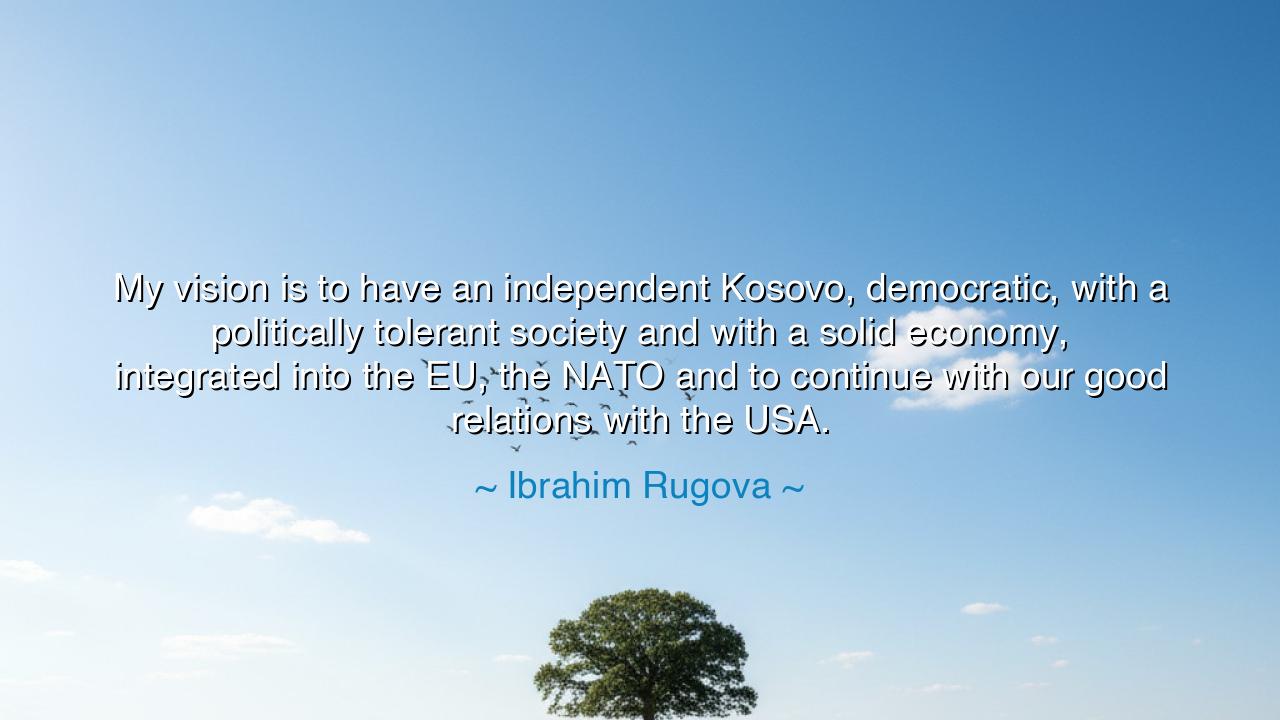
My vision is to have an independent Kosovo, democratic, with a
My vision is to have an independent Kosovo, democratic, with a politically tolerant society and with a solid economy, integrated into the EU, the NATO and to continue with our good relations with the USA.






Hear the words of Ibrahim Rugova, the “Gandhi of the Balkans,” who bore the heavy burden of his people with patience and vision: “My vision is to have an independent Kosovo, democratic, with a politically tolerant society and with a solid economy, integrated into the EU, the NATO and to continue with our good relations with the USA.” These words are not the boast of a conqueror, but the dream of a shepherd who sought to lead his people through fire without answering hatred with hatred. They resound as a call to peace, dignity, and belonging in a world that had long denied Kosovo its rightful place.
At the heart of Rugova’s words lies the yearning for independence—not the independence of isolation, but of dignity, where a people may stand upright without bowing to oppression. For centuries, Kosovo’s fate was bound to greater powers, its voice drowned in the storms of empire and conflict. Rugova’s vision was to break these chains, not with swords, but with persistence, diplomacy, and the courage to choose non-violence when the world expected blood. His dream was of a Kosovo that would no longer beg for recognition, but take its place as an equal among nations.
He spoke also of democracy, and of a society built on political tolerance. This was no small hope in a land fractured by ethnic conflict and centuries of mistrust. To build tolerance where hatred had long taken root was a heroic ambition, requiring more than law—it required a transformation of the human heart. Rugova knew that a nation can survive without wealth for a time, but never without unity. Thus, he declared that a true society is not one voice silencing the rest, but many voices speaking together in harmony.
Consider how his dream echoes the struggles of other leaders who sought peace amid turmoil. One may recall Nelson Mandela in South Africa, who emerged from decades in prison not with a call for vengeance, but with a vision for reconciliation. Like Mandela, Rugova’s power was not in the sword, but in the moral authority of a man who refused to let suffering harden into cruelty. Both men understood the same eternal truth: that to build a nation, you must first build the soul of its people, teaching them tolerance, dignity, and forgiveness.
Rugova also spoke of a solid economy, not as an idol to be worshiped, but as the foundation of stability. He knew well that poverty breeds despair, and despair breeds division. A people struggling for bread will find it harder to speak of freedom, democracy, or tolerance. Thus, his vision was not only of lofty ideals, but of practical strength—of work, of prosperity, of a livelihood that would allow his people to dream beyond survival. His gaze reached outward as well, toward the EU, the NATO, and the USA. He understood that no nation is an island, and that Kosovo’s survival depended not only on independence, but on friendship, integration, and the bonds of shared destiny.
The wisdom of Rugova’s words lies in their balance. He dreamed of independence, yet also of interdependence; of national pride, yet also of global partnership. He saw that the greatest strength of a small nation is not in isolation, but in weaving itself into the wider fabric of humanity. Thus, his vision was not narrow but expansive, not selfish but generous, seeking not only Kosovo’s place in the world, but also Kosovo’s gift to the world: the testimony that peace and non-violence can triumph even amid centuries of strife.
The lesson for us is clear: true leadership is not found in the thirst for domination, but in the courage to dream of peace where others expect war. A nation, like a man, must build its strength on dignity, tolerance, and friendship, or it will crumble beneath its own pride. Therefore, O listener, let your actions be these: in your community, sow tolerance instead of suspicion; in your work, strive for strength that uplifts others; in your vision, do not dream only for yourself, but for the generations to come. For Rugova’s voice teaches us that even in the darkest of valleys, the path of peace, though fragile, is the only path that leads to a future worth living.






AAdministratorAdministrator
Welcome, honored guests. Please leave a comment, we will respond soon